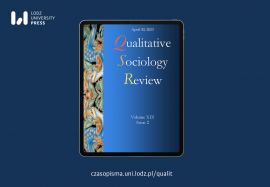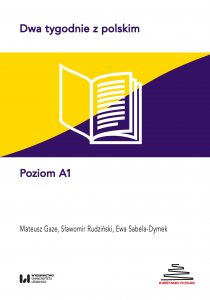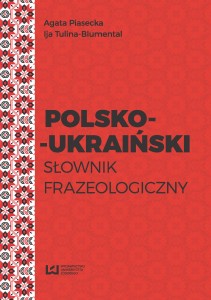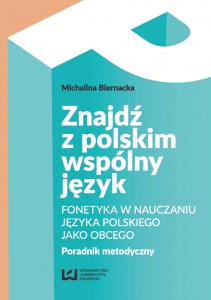Qualitative Sociology Review | VOL. 19, NO. 2 (2023)
Opublikowano: 12 maja 2023

For a long time, we have observed an increased interest in qualitative sociology, and the use of an interpretive frame to understand human actions, social processes, meanings and definitions, and new social theory generally. For this purpose, we created Qualitative Sociology Review – an open-access international scientific journal enabling a free flow of information and the integration of the community of qualitative sociologists.
Qualitative Sociology Review publishes empirical, methodological, and theoretical articles applicable to all fields and specializations within sociology. Every submitted paper is blind-reviewed and quality-controlled by two reviewers. The Editorial Staff and Consulting Editors strive to operate at a high level of scientific quality.
All sociologists who make use of an interpretative paradigm and qualitative research methodology are welcome to submit their articles and support our initiative. We especially welcome researchers who use symbolic interactionism perspective but also grounded theory, sociological ethnography, autoethnography, phenomenology, ethnomethodology, and who use the methods of observation of actions and analysis of lived experiences.
The Problematics of Gender for Aviation Emergency Communication during an Inflight Emergency: A Case Study
Angela Cora Garcia
Due to the rarity of female pilots, aviation communication is typically conducted in a single-gender environment. The role of gender in interactions during inflight emergencies has not yet been adequately explored. This single case analysis uses a qualitative approach based on conversation analytic transcripts to investigate how gender may be relevant either explicitly or implicitly in radio transmissions between flight crew and Air Traffic Control (ATC) personnel, as well as internal ATC phone interactions as participants work to handle an inflight emergency. This incident involved a female pilot and a male copilot, thus providing a naturally occurring rare event to explore the potential relevance of gender. The analysis shows that explicit references to gender are limited to occasional asymmetrical use of gendered address terms and gendered pronouns. Participants also used interactional formulations that—while not explicitly gendered—have been associated in previous research with gender differences in interaction, for example, the use of indirect forms of requests or complaints, actions that imply inferences about the emotional state of participants, or possible confusion over the identity of the pilot given the transitions between male and female sounding voices speaking on behalf of the plane. The findings are discussed in terms of implications for how gender differences can impact aviation communication during emergency incidents.
Southern Rural Feminism: U.S. Women Farmers in Production Agriculture
Cassie M. Duncan, April M. Schueths
Although U.S. women’s contributions to farming are vital, scholarship on U.S. female farmers is limited, especially in the U.S. South. Twelve women farmers in the Southern United States were interviewed about their experiences and opportunities in production agriculture. This study offers further nuance of the sociological and theoretical complexity and interpretive power of difference feminism and intersectionality, focusing on region and place, to a concept we call Southern Rural Feminism. Participants promote women’s equality yet acknowledge gender differences between the binary gender categories of men and women, where the uniqueness of a woman’s touch offers value to the agriculture industry. Nearly all participants’ everyday life in southern agriculture was grounded in the participants’ Christian faith, and some women used Christianity to explain gender dynamics. Within the context of the traditional rural southern culture, all women experienced differential gendered treatment in the industry, from welcomed gentlemanly behavior and gendered slights to more severe discrimination and harassment. Despite widespread gender problems, findings suggest most women do not view systematic gender oppression in the industry, do not adhere to feminist labels, and are cautiously optimistic about the future of female farmers. Incorporating theoretical discussions of Southern Rural Feminism is vital given U.S. Southern Farm Women’s restricted material access to land, and full participation in production agriculture, a field with tremendous gender inequities.
Entering Iranian Homes: Privacy Borders and Hospitality in Iranian Movies
Foroogh Mohammadi, Lisa-Jo K. van den Scott
The architecture of homes in Iran has changed significantly over the past four decades since the 1979 Iranian revolution. We ask how these architectural changes shift neighborhood relationships and how they transform the Iranians’ hospitality rituals and practices. We conducted a qualitative content analysis of eighteen Iranian movies filmed after the 1979 revolution. They allowed us to make comparisons among various dwelling patterns and neighborhood relationships. We argue that the representations of neighborhood relationships reflect these changes, demonstrating the impact of architecture on interactions. Our focus in this article is on borders of privacy, power dynamics in the neighborhoods and among families, and communication forms to better understand the impact of changing architecture on hospitality through the lens of cinema. Additionally, we engage with Goffman’s (1956) concepts of frontstage and backstage, demonstrating that these are not dichotomous, although they are opposites, and there can be a thinning of frontstage along with a thickening of backstage. Entrances to homes are often gradual, and visitors may gradually penetrate through layers of the frontstage as they become closer (emotionally and in space) to the heart of the home’s (and its occupants’) backstage.
The Australian Mainstream Media’s Portrayal of Youth Climate Activism and Dissent
Jacob Micah Cowan, Peta Dzidic, Elizabeth Newnham
The March 2019 School Strikes 4 Climate, predominantly organized by young students, garnered widespread and polarizing media coverage. We aimed to identify how Australian mainstream print news media portrays youth involvement and dissent within climate action movements. A qualitative media framing analysis was conducted to determine how youth climate activists and dissent were presented during the first large-scale youth climate protests in Australia. Australian newspaper articles and opinion pieces (N = 101) were identified via ProQuest and screened. An inductive thematic analysis was conducted in NVivo12. Findings were assessed through a typology of dissent to determine how different forms of dissent were represented in the Australian print news media. The framing of dissent in Australian media coverage was varied, with news articles being more likely to prioritize the voices of young people, while opinion pieces resorted to fear-mongering rhetoric that critiqued and invalidated their agency. Protestors used combinations of dutiful and disruptive dissent to advocate for climate action, with the latter being more effective for challenging systemic drivers of climate change.
“What Would You Do If You Were to Win the Lottery?” A Qualitative Tool for Overcoming Agency-Structure Issues in Migration Research
Gergely Horzsa
This paper proposes a quasi-standardized hypothetical interview-guide question and demonstrates its applicability in addressing participants’ general life aspirations, and, in particular, the embedded migration aspirations. The proposed interview question is related to the hypothesized behavior of participants in the off chance of having won the national lottery. Based on fieldwork results, conducted in rural Hungary between 2014-2019, the paper demonstrates how this question, introduced as a closing question during interviews, may be useful in addressing cultural values and attitudes in an agency-oriented way and with a reduction of perceived structural constraints affecting them. The question was eligible in differentiating between forms of geographical mobility, reflecting some migration-related phenomena that were formerly claimed challenging to be specifically addressed, revealing that pro-migration structural constraints might mask general attitudes to stay among those seemingly opting for emigration, and conversely, structural, restraining-constraints that, in some cases, mask pro-migration attitudes among those seemingly aspiring to stay.
Komentarze
Ten post dostępny jest także w języku: angielski





